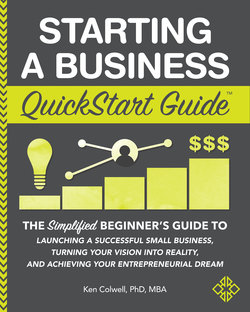Читать книгу Starting a Business QuickStart Guide - Ken Colwell PhD MBA - Страница 13
На сайте Литреса книга снята с продажи.
What’s in a Thumbprint?
ОглавлениеAn entrepreneurial thumbprint—like an actual fingerprint—is unique to each person. Fingerprints all look similar at a glance, but upon closer inspection we see that no two are alike. Unlike our fingerprints, however, we are not born with entrepreneurial thumbprints. Furthermore, unlike fingerprints, an entrepreneurial thumbprint evolves over time. It is a blend of our skills, talents, connections, and experience.
In exactly the same way that an opportunity cannot exist independently of an entrepreneur, your entrepreneurial thumbprint cannot exist independently of you. In fact, it is you! To uncover the ridges and whorls of your own entrepreneurial thumbprint, ask yourself the following questions:
What are you passionate about?The topic of passion comes up frequently in this book and in any conversation involving entrepreneurship and the act of starting a business. If you’re not passionate about an idea, it will stay an idea. It may be a good idea, it may be an interesting idea, but if you aren’t inspired to make it a reality or passionate about its execution, then it will never manifest into an opportunity. Conversely, where you may lack passion for an idea or a business concept, another would-be entrepreneur may be excited about bringing it to fruition. Your personality, interests, inspirations, and passions contribute to forming your entrepreneurial thumbprint.
What do you know well?It’s okay not to have an advanced understanding of business concepts at first. In fact, many successful entrepreneurs are not MBA holders. Starting a business isn’t as simple as monetizing your passion, but that underlying passion and knowledge forms the solid core of your entrepreneurial thumbprint. Someone who travels avidly and has a lot of experience navigating the world of rental cars, air travel, and hotel bookings is better suited to starting a travel agency than someone who has never left the country.
Who do you know?Having a huge social network isn’t a prerequisite to success, but a long contact list can certainly help. A portion of your unique entrepreneurial thumbprint is composed of your network—both personal and professional. These people may be the first ones you reach out to when it’s time to start funding your venture, but when it comes to distinguishing the difference between an idea and an opportunity, you’ll find that your network is worth more than a round of financing. Who do you know that has skills or knowledge that complement your own? Better yet, who do you know that has skills or knowledge that fills in gaps in your own experience? Do you know anyone who could act as a mentor or provide other forms of guidance on your entrepreneurial journey? Are there members of your network who can get the word out about your new venture, or lend a hand getting you off the ground?Ultimately, your personal/professional network plays a large role in defining your entrepreneurial thumbprint.
Is there a particular problem you want to solve?If you are familiar with a particular field or industry, it is more than likely that aspects of it that frustrate you also frustrate others. Inconveniences, limitations, and frustrations—collectively referred to as pain points—are tremendous drivers of entrepreneurial opportunity. This is true even if you don’t know exactly how to fix the problem right now. As you explore the idea, discuss the issue with others, and gain a greater understanding of the how and why of the problem, it will become clear whether the other aspects of your entrepreneurial thumbprint can help you transform this into a real opportunity.
If the elements of an entrepreneurial thumbprint seem circumstantial and subject to change, that’s because they are. Nothing is set in stone. Entrepreneurs aren’t born to start new ventures. Entrepreneurs are people, and as we learn and grow, our entrepreneurial thumbprints become better defined along the way.
A final note on the topic of entrepreneurial thumbprints: keep in mind that at the end of the day, starting a business is a creative act. As with any act that stimulates us creatively, inspiration can come from anywhere, even places that surprise us. As you will see in the next chapter, the idea that entrepreneurs are born, not made, is not only erroneous, but self-limiting. The sheer number of ideas matched with the sheer diversity of entrepreneurial thumbprints completely turns this idea on its head.
